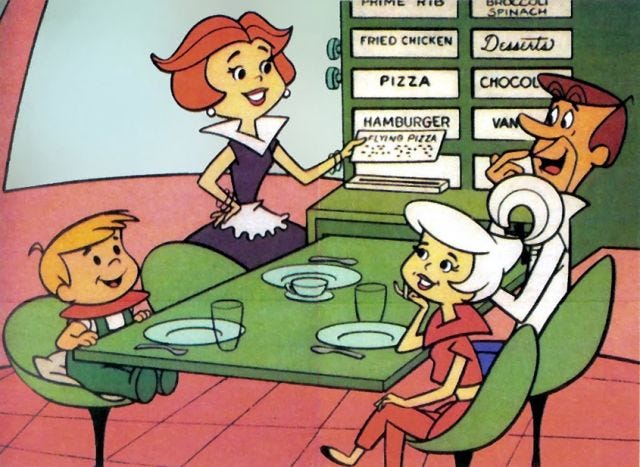So What, Who Cares (vol 2, issue 50) Who's really the brains in a smart home

Hello! The publication schedule is shifting this week because I am up to my eyebrows in RSA 2015 coverage right now, and let me tell you, contemplating things like "Eventually, an army of rebellious middle-schoolers will figure out how to brick their parents' smart fridges and trigger a food shortage in the sunbelt" takes it out of you.
(Also, FYI, my coverage of Bates Motel continues, well, unabated. I'm sorry. I had to do that.)
Anyway, I wanted to thank you all for sending me your canon selections. The truth is, there were so many responses, I am still trying to read and reply to them all. But the SW,WC Childhood Read Canon will be coming to a newsletter near you this week, for real and for true.
So what have you been up to this week? Dish via Twitter or email.
*
I am not joking about being able to brick your parents' fridge. (Note to the non-techie among us: "bricking" refers to rendering a piece of technology as interactive as ... well, a brick.)
Entry-level "smart" appliances that let you automate your home or control the data parameters -- like, say, a thermostat -- are remarkably easy to monkey with. Witness this fantastic tale of an ex-husband's revenge on his former wife and her new flame via a review for the Honeywell WiFi Smart Thermostat:
Since this past Ohio winter has been so cold I’ve been messing with the temp while the new love birds are sleeping. Doesn’t everyone want to wake up at 7 AM to a 40 degree house? When they are away on their weekend getaways, I crank the heat up to 80 degrees and back down to 40 before they arrive home. I can only imagine what their electricity bills might be. It makes me smile. I know this won’t last forever, but I can’t help but smile every time I log in and see that it still works. I also can’t wait for warmer weather when I can crank the heat up to 80 degrees while the love birds are sleeping. After all, who doesn’t want to wake up to an 80 degree home in the middle of June?
Granted, this is a) an unconfirmed anecdote, and b) possible only because the person in the house did not take appropriate security measures once she kicked out the dude who happened to have the "here's how to control the thermostat" app on his phone or whatever. But the "b)" condition brings up an important point: These consumer products may not be easy for their users to secure. Or consumers simply don't consider their home automation products to be something that has to be secured like their phone or computer.
So what? You're going to see a tension between usability, security and cost in the home automation market. Why? Because good UI design costs money -- you have to know what your users are doing, how they're going to use something, how they can break it, and then you have to basically come up with something nearly idiot-proof.
Or you don't, because you figure that in the time/money tradeoff on design, the implicit contract you have with the user is "I am charging you less money, so you'll sink more time into making this work for you."
Who cares? Home automation device manufacturers. Nobody wants to be known as "that company that makes the monitors that let the preverts watch your kids sleep." (cough, cough, Foscam) But, as Colby Moore, a security research engineer at security firm Synack, points out: "Manufacturers, if they chose to, they could do these things right. The technology is available. They just aren't doing it yet."

(So there's a platform issue for the next politician who wants to make their bones on consumer rights: Address safety concerns for the Internet of Things.)
There's also an opportunity for media types here to carve out and own the "automate your home without it turning into a hellish dystopian nightmare" niche in journalism.
There's a whole new market for home-grown hackers to debug or upgrade smart home tech for people who want all the perks of home automation and don't want to do the labor required to keep the software and hardware up to date.
And it's the best interest of utility companies for consumers to run toward smart home technologies too. Imagine having all that data on how much electricity and water people use -- and when they use it! Now imagine pricing on demand. I mean, our TVs were already snitching on us without our consent. The water heater can't be that far behind.
*

Today's pop culture note: Before there was Cheryl Strayed and Wild, there was Robyn Davidson and her trek across Australian outback.
In 1977, Davidson spent nine months walking from Alice Springs to the Indian Ocean; four camels and a dog accompanied her on the 1700-mile journey. Her story was originally featured in the National Geographic, then she wrote a book called Tracks: A Woman's Solo Trek Across 1700 Miles of Australian Outback. Thirty-odd years later, Mia Wasikowska played Davidson in the most excellent movie Tracks.
Why is it so great? Because it's a real find in the all-too-small woman-in-the-wild genre. as As Kathryn Schultz explains of Wild's appeal:
Outside of slave narratives and horror fiction, adult American literature contains very few accounts of a woman alone in the woods. Yet Wild is the story of a woman who voluntarily takes leave of society and sustains herself outdoors, without the protection of a man, or, for that matter, of mankind. It is the story of a woman who does something physically demanding day aftabout:blanker day, of her own free will, and succeeds at it.
On a related note, Aeon magazine unpacked the rare instance of the female hermit, kicking off the piece with this premise:
For those of us who want to be alone, who still crave it even after all the abuse and skepticism, there are few guides and even fewer celebrations of female solitude. Who is the female hermit? Does she exist? Who is the woman who can look out at the world and in all seriousness say: ‘I want to be alone’?
To be alone, after all, is to admit to that rare quality: a contentment with one’s self.
One of the things I loved about Tracks was watching how hard Robyn worked to come to that contentment. The movie begins with her quote, "There are new kinds of nomads, not people who are at home everywhere, but who are at home nowhere. I was one of them." And the movie ends with her saying, "Like with any journey, it's not what you carry, but what you leave behind," the words fading into one of the most beautiful and gratifying closing shots I've seen in a movie.
Tracks is available via Netflix, for rental via iTunes, or streaming via Amazon.
*
Are there typos? I apologize in advance. The only editing class I did not get an A in was copyediting.
Did you miss an issue of So What, Who Cares? The archive is here.
Would you like a run-down of all the books and other pop culture picks ever mentioned in this newsletter? Then check out the Pinterest board. (Note: None of the links are affiliate links; I do not make money off anything I link to.)
If you really like So What, Who Cares?, tell a friend to subscribe.


